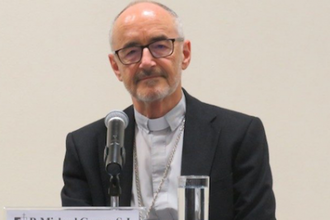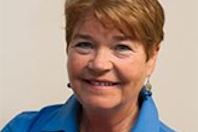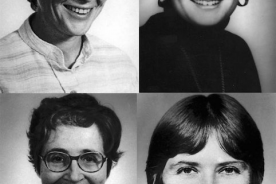Rome: Cardinal Michael Czerny SJ at 40th anniversary Mass for four missionaries martyred in El Salvador

Cardinal Michael Czerny SJ
Source: Vatican News
Cardinal Michael Czerny SJ gave this homily tonight at the 40th anniversary Mass for the four women missionaries martyred in El Salvador.
... Isaiah 25:6-10, Psalm 22(23), Matthew 15:29-37 ...
"If I should walk in the valley of darkness, no evil will I fear."
This act of faith from the Good Shepherd Psalm resonates with the greatest poignancy as we remember four generous missionaries who forty years ago braved the valley of darkness in El Salvador. Today we mournfully recall their violent deaths and gratefully celebrate the triumph of Life, life to the full.
On Good Friday the liturgy proclaims the Passion of our Lord and, knowing that he is risen, we meditatively re-live his sufferings and death with the hope of sharing in his resurrection. Today I will recount the passion and death of Jean, Dorothy, Ita and Maura as narrated by a Canadian missionary, Fr Gregory Chisholm, now serving in Pucallpa in the Peruvian Amazon, probably the closest we'll ever have to an eyewitness account.
On 27 November 1980 -- eight months after the martyrdom of St Oscar Romero - five top leaders of the Democratic Revolutionary Front1 in government were kidnapped and murdered by a death squad. A five-person ecumenical Church delegation from Canada and the USA went to attend their funeral, and I (Fr Greg Chisholm) was one of them. We arrived in the early evening of Tuesday 2 December at the brand new airport - it had opened ten months earlier - well outside the capital city.
As we passed through immigration and customs, there was an atmosphere of great tension and nervousness, with several people detained and international journalists having their equipment confiscated.
In the main hall of the airport we met Sister Dorothy Kazel, an Ursuline nun, and a lay missionary from Cleveland, Jean Donovan, both U.S. citizens. They greeted us with kindness, but were obviously very nervous; they were waiting for the (delayed) arrival of their good friends and fellow Americans, Sisters Ita Ford and Maura Clarke, Maryknoll Sisters who were returning from a short trip to Managua. We said our good-byes, expecting to see them the next day, and left the airport in a minibus sent by the archbishop's office to meet us. As we left the airport, we commented on how our vehicle was identical in every detail to that of the Sisters who were hoping to be leaving the airport less than an hour later.
We proceeded down the broad new highway, quite deserted and unlit. After about ten minutes, in an extremely dark section of the road, several heavily-armed members of the national security forces emerged abruptly from a deep trench on the side of the road, stopped our vehicle, surrounded it and aggressively demanded to see our documents. The driver of our van, secretary to Bishop Rivera y Damas, the acting diocesan administrator, demanded to know what this unusual intervention was all about. He said that we were Canadian visitors. Somewhat incredulous, the military asked directly if we were American citizens and demanded to see our passports. Once convinced that we were Canadian, they somewhat reluctantly let us pass.
A very short time afterwards, at this very spot, the same security forces stopped an identical vehicle for which they had obviously been on the lookout. Finding the four American missionaries in the vehicle, they beat them, raped them, and executed each one with a bullet in the head. They buried them in a shallow grave.
The next day the 3rd, after the very tense funeral of the FDR leaders and some threats of violence in the central plaza, we learned about the disappearance of the four women and their possible deaths. We called the US Embassy for help and, the following morning, the 4th, Ambassador Robert White accompanied us to the airport.
On the way to the airport, at the side of the road, we came upon the sisters' abandoned and burnt-out minibus, and we took in all the details of the horrible scene. Upon arriving at the airport, Ambassador White was informed that the bodies of the Sisters had just been found in a shallow grave. He broke down with great grief and tears since he had known the Sisters quite well. He then left to recover the bodies...
Far away in Washington, a new government - that of President Ronald Reagan - had been elected a month earlier but not yet taken office. The same day the missionaries' bodies were found, Alexander Haig, recently nominated as the next Secretary of State, made the shameless and absolutely unfounded suggestion that the Sisters had maybe "run a roadblock and been killed in an exchange of fire". In fact, the completely burned out minivan showed no signs of bullet holes whatsoever.
In the same arrogant way Jean Kirkpatrick, recently nominated by Reagan as US Ambassador to the UN, just a few days before the death of the Sisters had said publicly that the human rights policy of the out-going Jimmy Carter regime "...would be thrown out into the garbage under the Reagan government". Then, shortly thereafter she declared that the missionaries killed in El Salvador were "more political activists than religious sisters"!
Thus far, the account of Fr. Greg Chisholm, for which we give thanks to God.
But this is not the last word in the passion of Jean, Dorothy, Ita and Maura. While in 1984 four former members of the National Guard were convicted of killing them, three decades later, one of them confessed his participation in the crime to another Maryknoll Sister working in El Salvador. And he asked for forgiveness. So true vindication may come, not from very imperfect human justice, but from divine reconciliation. This surely is a triumph of mercy, of light over darkness, of life over death.
"Today's martyrs," Pope Francis pointed out in April, "outnumber the martyrs of the first centuries." The numbers attest to the enormity of the tasks of faith, love and justice in our world and, opposing them, the reactions of the forces of despair and violence. The Holy Father further commented and questioned, "It is interesting and striking to note how hostility grows to fury in the persecution of martyrs... How does one get to rage against Christians, against Christian witness and against the heroism of Christians?"
Nearly three millennia ago, Isaiah prophesied:
On this mountain [the Lord of hosts] will remove the mourning veil covering all peoples,
and the shroud enwrapping all nations,
he will destroy Death for ever.
The Lord will wipe away
the tears from every cheek;
he will take away his people's shame everywhere on earth,
for the Lord has said so (Is.25:7-8).
Echoing Isaiah, the Holy Father proclaimed that "...in persecutions there is always the presence of Jesus who accompanies us, the presence of Jesus who comforts us and the strength of the Holy Spirit that helps us to go forward. Let us not be discouraged when a life that is faithful to the Gospel draws persecution..."
Jean, Dorothy, Ita and Maura were martyrs at a local, humble level, in their work with the poor, with the displaced, with the grieving. They witnessed to a loving God whose preferential love is for the poor and marginalized. They did so, not so much with words as by re-enacting and indeed re-incarnating what today's Gospel recounts: " The lame, the crippled, the blind, the dumb and many others" were " put down at his feet, and [Jesus] cured them" (Mt. 15:30). As Jesus did vis-à-vis the powerful of his time, the four missionaries also testified to those who have ears but do not hear the cry of the poor, whose arrogant and cynical eyes do not see the Kingdom of God at hand.
Jean, Dorothy, Ita and Maura were evangelizers and are martyrs. Theirs, mysteriously but without doubt, is the triumph, because vigorous, courageous acts of solidarity and compassion persist in dreadful, risky conditions; brutal crimes failed and fail to stop the evangelizing. Our loving Lord Jesus Christ continues to offer his life (even in this year of pandemic) in widespread suffering and too many deaths, but with the sure promise of overcoming death forever.
While celebrating here in Rome, sponsored by the Caravita community in collaboration with the JPIC commission of USG and UISG in Rome and the Romero Trust in London, we join in communion with a great Mass and celebrations of the martyrs in Chalatenango Cathedral and at the shrine in San Pedro Nonualco organised by the Cleveland Mission. The Maryknoll Sisters are holding a liturgy in their New York motherhouse for families and friends of their martyrs and Maryknoll missionaries connected online around the globe, as well as Eucharists in Los Angeles and elsewhere in the U.S.A. In London the Romero Trust is holding a commemorative liturgy in conjunction with the Conference of Religious and CAFOD.
In all these locations, we join together today, mournfully to remember the passage of Jean, Dorothy, Ita and Maura through the valley of darkness and gratefully to celebrate the triumph of their faith and goodness and God's infinite mercy.


















